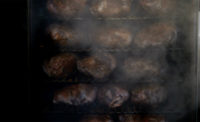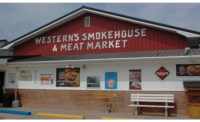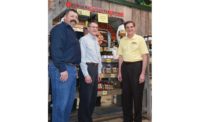Seltzer's Smokehouse Meats preserves the Lebanon bologna legacy
The leader in Lebanon bologna maintains its time-honored traditions.
















Some great new products are created after extensive research and development, consumer surveys and testing. Others happen when a clear need presents itself in the marketplace. Occasionally, though, a new product is discovered after a simple mistake. Just like penicillin was the end result of a messy lab bench, Seltzer’s Double-Smoked Sweet Lebanon Bologna came about after an error in a smokehouse.
“It was one of those serendipitous things,” says Ron Fouché, Seltzer’s Smokehouse Meats manager explains. “Workers had emptied the smokehouse, and for one reason or another, they forgot a rail on the second layer.”
There were 17 bolognas left in the smokehouse, and when workers refilled it with long logs for slicing, they were accidentally smoked twice. Workers discovered them, unloaded them, and the manager of the company’s outlet store brought them to Fouché and asked what to do with them.
“They looked alright, but you could tell the strong smoke,” he says. “I said, ‘Let’s cut them up into 2-pound pieces and sell them for a dollar a pound.’ Big mistake! All of a sudden, people liked it and came back and asked for it.”
After some discussion with the production team, the company was able to determine exactly what had happened with the bologna and how to duplicate that taste. That production accident has gained a nice following, and Seltzer’s is producing several hundred pieces a week of the Double-Smoked Sweet Bologna.
“It’s going back to when I came here, and we had a drier Lebanon bologna. We had it down to about 58-60% moisture; now we’re somewhere around 64-65% moisture,” Fouché says. “As time evolved, for one reason or another, consumer tastes changed to where they like it a little more moist. The double-smoked sweet we’re bringing down close to that 60% level.”
New products and new packaging options are part of Seltzer’s repertoire like any other processor, but the Palmyra, Pa.-based company occupies an important space in the meat industry. Lebanon bologna is a Pennsylvania specialty — it is not boloney and has a smoky tang that separates it from other deli meats. The production of it is somewhat of a dying art, as attrition has taken a toll on the processors.
“When I came in the business, we had 14 or 15 companies making Lebanon bologna. Today, there are only four of us left,” Fouché says. One of those former companies, Baum, still lives on as a brand that is produced by Seltzer’s. It’s a regional specialty that’s popular in the area of Pennsylvania that includes Harrisburg, Lancaster and York. The spice blend for that particular product is still prepared by a member of the Baum family.
Of the survivors, Seltzer’s is the only company that produces Lebanon bologna with the traditional methods. The original formula was developed by founder Harvey Seltzer in 1902, and the production method hadn’t changed much from his era. The company is still owned by the founding family, with Craig Seltzer serving as the company’s owner/president. The equipment that the company uses to mix, grind and slice the bologna may be in keeping with the times, but the bologna logs are still encased in mesh netting and hung in multi-layer, outdoor wooden pit-style smokehouses, where they will remain for three days to cure. Workers still toss bologna logs from the ground to the higher levels, and when finished, the smoked logs are tossed down and caught by sure-handed employees.
“You can make the product in ovens, but you just can’t make our type of Lebanon bologna. You have to take that natural wood smoke,” Fouché says.
The hardwoods the company uses are sourced from areas north of Seltzer’s. Hardwoods burn with a higher BTU than softer woods and release fewer hydrocarbons. The wooden smokehouses last for about 12 years before they are town down and replaced. The company recently rebuilt the #7 smokehouse, with two more rebuilds planned before the end of the year.
Despite the shrinking number of Lebanon bologna makers, Seltzer’s is producing more product now than it ever has. Fouché estimates that the company makes about 115,000 to 120,000 pounds per week. With multiple packaging options, consumers can get sliced products in mini-chubs as well as 6-, 8-, 12- and 16-ounce packages. He says that the company’s products are shipped to retailers in chubs to be sliced at the deli, as well as in pre-packaged slices, in roughly equal amounts.
The company’s growth has come from places like Costco and Walmart, which have massive reach and distribution systems. The growth of those retail giants has replaced the old model that was in place when Fouché came on board.
“The mom & pops are pretty well gone. There are just a few corner grocery stores. The small distributors, we had tons of them over many states. Most of those people are out of business,” he says. “We’re actually doing more business now than, say, 20 years ago. But it’s a different way of doing business.”
A 60-year anniversary
There is a sign in Fouché’s office that offers congratulations for his 50th anniversary at Seltzer’s. That sign itself is 10 years old now, as Fouché marked 60 years of employment at Seltzer’s in August.
“I think I came here August 3, 1957. I’ve got to stick around until I get it right!” he says, laughing.
The Seltzer’s job was actually his second job after college. He went to church with the Seltzer family and knew them well, but he originally took a position at American Casualty, an insurance firm in Reading.
“They hired about 20 of us as interns. It was a matter of, who’s going to stick around the longest,” he recalls. “Out of my group, the 20, a man named Fisher is the only one who stayed with the company. He actually ended up becoming a vice president. I started at the end of June and worked there in July, and it was not much fun.”
On a trip back home, he had a meeting with Seltzer’s general manager, who offered him a job as a salesman.
“I was making $71 a week working at American Casualty, and he paid $70. I took a great big pay cut,” Fouché says with a smile.
His job was to visit supermarkets in the Delaware Valley. There were approximately 125 then, and he stopped in to visit twice a week. That amounts to making about 50 visits per day, every day, for a couple of minutes to check on the stores and visit briefly with the deli managers.
“I couldn’t hire five people to do that [today],” he says. “But nobody told me I couldn’t do it, so I just did it. I started at 6:00 in the morning and worked until 6:00 at night.”
In the days before GPS, Fouché navigated his way around Philadelphia using the most obvious landmark in the city: The statue of William Penn. At the time, no building was allowed to be taller than Penn’s statue, so it was usually visible.
“I used to put Bill Penn at my back in the morning, and in the evening I would look for him,” he says.
The frequent visits helped grow his knowledge of the meat industry, and it also helped him make good contacts. Some of those people who started off as meat managers in the deli eventually worked their way up the ladder.
“One became one of the big guys at one of the chains. When he took the job over, he put us in and took our competitor out,” he says.
Fouché’s territory eventually grew to cover most of the United States. After 60 years, he’s finally starting to scale back his workload. He’s now working 30 to 40 hours a week instead of 60 hours a week.
“Thank goodness I have a great wife. She raised our daughter and son, so that made them good kids. I probably would have done the wrong things,” he jokes.
Seltzer’s has become an iconic brand because of its products, its longevity and its adherence to production traditions. It has a mail order business that helps take care of Pennsylvania expatriates who still want to get their taste of Lebanon bologna. That mail order business also picks up for the holidays and every time the “Dirty Jobs” episode at Seltzer’s is shown in reruns. That show originally aired in 2009 and was one of the most popular locations of the show’s eight-season run.
The regional love of Lebanon bologna in general and Seltzer’s in particular is such that a local brewery worked with Seltzer’s to develop the logical companion to Lebanon bologna — a smokehouse beer. Snitz Creek Brewery introduced Seltzer’s Smokehaus 7 several years ago, and it is a smoky-flavored beer that pairs very well with the brewery’s Lebanon Bologna sandwich (a grilled cheese sandwich with Seltzer’s regular or sweet bologna, served on a pretzel roll).
The beer actually starts at Seltzer’s, which supplies Snitz Creek with used smokehouse nets.
“They stuff them full of grain and send them back up here, 20-40 at a time, and we stick them in the bottom of a smokehouse. They get smoked with the bologna. They take that grain back, and that’s what they use,” Fouché says. “They have an old Number 7 smokehouse door there, too.”
All product photos courtesy of Seltzer's.
Looking for a reprint of this article?
From high-res PDFs to custom plaques, order your copy today!














